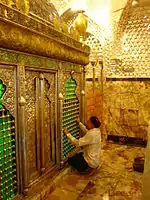Daniel in Islam
Daniel (Arabic: دانيال, Dānyāl) was a prophet sent to the Children of Israel. Despite not being directly mentioned in the Quran, sources mentioning him is retained in the Islamic traditions and exegesis, thus acknowledged by Muslims as one of God's messengers.[1][2][3]
Part of a series on Islam Islamic prophets |
|---|
|
|
| Part of a series on |
| Islam |
|---|
 |
Historical accounts suggests that during the Muslim conquest of Tustar, his remains were found along with relics and scriptures, after which Umar ordered to be secretly reburied.[4]
Background
Muslim tradition has retained two distinct figures named Daniel in the Hebrew Bible. The first was the sage of an earlier time as mentioned by Ezekiel, often referred as "Daniel the Elder" and the second being the prophet who lived at the time of the Babylonian captivity, whose life was chronicled in the Book of Daniel, canonized in the current Hebrew Bible.[5] However some scholars have rejected the differentiation of Daniel the Elder and Daniel, and to assume Daniel as one person.[6][7]
Prophet Daniel's character in Muslim tradition has shaped the figure in a similar way to that of Prophet Idris (Enoch) as he is considered to have been a revealer of future mysteries, coupled with one who excelled in scientific matters.[8][9]
Daniel in Muslim literature
Muslim tradition recounts that Daniel preached in Babylon, calling the people to return to worshipping God. He presumably lived during the reign of Cyrus and taught him the unity of God and the true religion of Islam.[10]
Key events from Daniel's life which are recounted in Quran exegesis are the presence of Daniel and his companions in the court of Nebuchadnezzar. The dreams of Nebuchadnezzar, the friction between Daniel and his detractors, his miraculous delivery from the den of lions, Belshazzar's feast and the deciphering of the mysterious writings. Other events from the Book of Daniel, such as Susanna and the Elders, has not been acknowledged in tradition.[11]
One of unique perspective that is narrated in Muslim writings that is not found in Jewish tradition, is that of Prophet Jeremiah meeting Daniel. A similar event involving Habakkuk and Daniel, however, is to be found in Lives of the Prophets.[12] Ibn Abi Al-Dunya narrated the following, based on a chain of citations:
Nebuchadnezzar captured two lions and threw them into a pit. He then brought Danyal and threw him at them; yet they did not pounce at him; rather, he remained as God wished. When then he desired food and drink, God revealed to Jeremiah, who was in Sham: "Prepare food and drink for Danyal." He said: "O Lord I am in Jerusalem while Danyal is in Babylon." God revealed to him: "Do what I have commanded you to do, and I shall send you one who will carry you and what you have prepared." Jeremiah did so and God sent him something that would carry him until he arrived at the brink of the pit. Then Danyal asked: "Who is this?" He answered: "I am Jeremiah." He asked: "What brought you?" He answered: "Your Lord sent me to you." He said: "And so my Lord has remembered me?" He said: "Yes." Danyal said: "Praise be to God Who has never forgotten me! And Praise be to God Who never forgets those who appeal to Him! And Praise be to Him Who compensates good with good, rewards patience with safety, dispels harm after distress, assures us when we are overwhelmed, and is our hope when skill fails us."
Daniel also appears in The Thousand and One Nights. On Night 394, in the tale of ‘The Pious Jewish Woman’ he appears as a 12-year-old boy who mediates in the case of a woman falsely accused of adultery. The book refers to him as a prophet.

See also
- Mausoleum of Danyal, Tarsus, Turkey
- Tomb of Daniel, Susa, Iran
- Walter Benjamin
Bibliography
- Emil G. Hirsch and M. Seligsohn (1906), Daniel, Jewish Encyclopedia; citing:
- Tabari, Chronigue (French transl. by Zotenberg), i. 44, 496, 503, 571, ii. 283;
- Mas'udi, Les Prairies d'Or (ed. B. de Meynard), ii. 128;
- Barthélemy d'Herbelot, Bibliothèque Orientale, s.v.
- 'Balkhi, al-Badwa wa'l-Tarikh, ii, 156 f./144; 165/150 sq.; iii, 114 f./ 118 f. and c.f. index
- Thalabi, 'Ara'is al-Madjalis, 198 - 202
References
- A-Z of Prophets in Islam and Judaism, B.M. Wheeler, Daniel
- Tabari, Volume I: Prophets and Patriarchs, 647, 652-654
- "21. The Ethos of Prophet Daniel". 8 June 2015.
- Mukaddasi, 417 (c.f. C. Cahen, in Arabica, 1959, 28)
- Ezekiel. xiv: 14, 20 and xxviii: 3
- Stories of the Prophets, Ibn Kathir', Daniel
- "al-Jawaab as-Saheeh (Answering those who altered the religion of Jesus Christ)" (PDF). p. 367.
- Hughes Dictionary of Islam, T.P. Hughes, Daniel
- Malhamat Daniyal
- Tabari, i, 665-668, 717
- Mas'udi, Murudj, i: 117, 120; ii: 115 ,128
- A-Z of Prophets in Islam and Judaism, Wheeler, Habbakuk